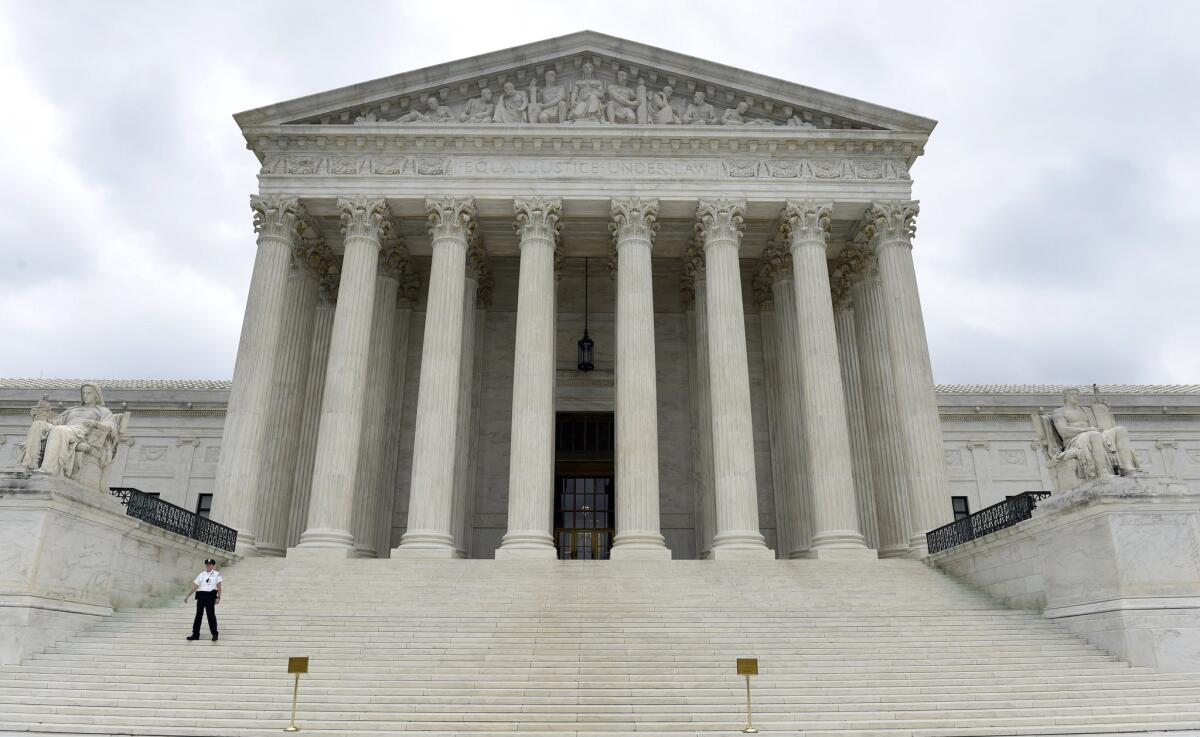Editorial: ‘One person, one vote’ should stay that way

The
- Share via
Five decades after the Supreme Court ruled that legislative districts must be drawn on the basis of “one person, one vote,” the justices have agreed to consider a claim that representation should reflect the number of eligible voters in a district, not the overall population.
They should reject such a radical interpretation, which would undermine the principle that legislators must be attentive to the needs of all of the people living in the areas they represent. That includes children and the noncitizens who in many parts of this country — including Southern California — form a significant and productive part of the population.
Many legal experts were surprised last week when the justices agreed to hear the case, which was brought by two Texas voters who argue that the apportionment of the state Senate unconstitutionally denied them equal protection of the laws because it was based strictly on overall population. Because of the high numbers of nonvoters in some districts, the challengers contended, some voters have a greater ability to influence Senate elections than others. In their appeal, the challengers complained that the Senate votes of some Texans are “approximately one and one-half times” the value of their votes.
The issue of vote dilution also figured in Reynolds vs. Sims, the 1964 decision in which the Supreme Court overturned an Alabama apportionment scheme that involved districts of different sizes. Writing for the court, Chief Justice Earl Warren said that states couldn’t weight the votes of citizens differently “merely because of where they happen to reside.”
But that case involved total population, not the numbers of eligible or registered voters. In general, as the lower court in the Texas case observed, the Supreme Court has used total population as the metric of comparison, though it hasn’t insisted on a single form of measurement.
The plaintiffs in the Texas case want the court to rule that reapportionment plans must take account of the distribution of voters or potential voters, not just residents. But if the court were to endorse that principle, it could have profound consequences, shifting power from cities such as Los Angeles with large noncitizen populations to suburban areas. At the risk of seeming parochial, we find that prospect troubling.
A more significant problem with basing representation on voter population is that it obscures the obligation of legislators to serve all the residents of their communities, not just those who can vote for them. As Assemblyman Luis Alejo (D-Watsonville), chairman of the Latino Legislative Caucus, told The Times: “Many of us who represent a large number of noncitizen immigrants assume a responsibility to represent everyone within our districts, regardless of their citizenship status.”
And rightly so. As the U.S. 9th Circuit Court of Appeals said in a 1990 decision involving the apportionment of the L.A. County Board of Supervisors: “The purpose of redistricting is not only to protect the voting power of citizens; a coequal goal is to ensure equal representation for equal numbers of people.”
That second objective would be hard to achieve if noncitizens were excluded when district lines were drawn. Some legislators might end up representing vastly more populous districts than others, resulting in less constituent service for citizens and noncitizens alike.
Large numbers of noncitizens do pose a problem for the political system. As this page has observed, it would be desirable if the millions of noncitizens living permanently in this country — legally and illegally — obtained U.S. citizenship and along with it the right to vote. Democracy functions best when those who are affected by government policies have the ability to shape those policies at the ballot box.
But in the meantime, millions of people who lack the right to vote nevertheless have a stake in government and a claim on the attention of public officials. They need to be counted.
Follow the Opinion section on Twitter @latimesopinion and Facebook
More to Read
A cure for the common opinion
Get thought-provoking perspectives with our weekly newsletter.
You may occasionally receive promotional content from the Los Angeles Times.









